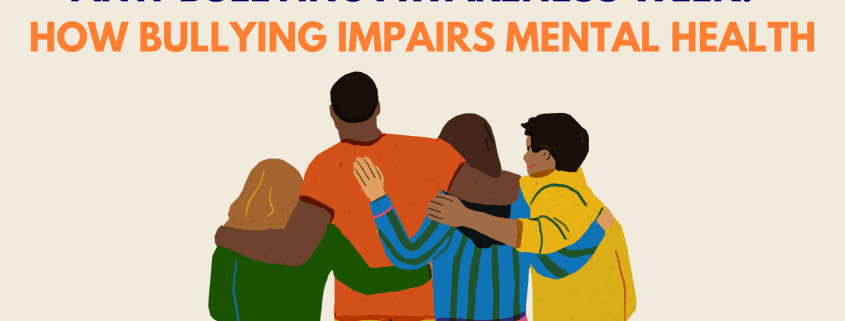
Anti-Bullying Awareness Week: How Bullying Impairs Mental Health
November 13th-17th is Anti-Bullying Awareness Week. Everyday, bullying affects millions of people worldwide, with consequences that extend far beyond the immediate torment of the victim. The importance of anti-bullying efforts in preserving and promoting mental health cannot be overstated. Bullying has been recognized as a significant contributor to various mental health issues, and combating this problem is essential for the well-being of individuals and society as a whole.
Bullying can take many forms, including physical, verbal, relational, and cyberbullying. It often involves the repeated use of power to intimidate, harm, or control another person. Bullies target individuals for various reasons, such as differences in appearance, behavior, or interests. The impact of bullying is profound and can lead to a wide range of mental health issues, making it crucial to address this problem promptly and effectively.
The Impact of Bullying on Mental Health
Depression and Anxiety
One of the most common consequences of bullying is the development of mental health issues like depression and anxiety disorders. Victims of bullying often experience feelings of sadness, worthlessness, and hopelessness. The persistent emotional distress and social isolation resulting from bullying can lead to long-term mental health challenges. It’s not uncommon for individuals to develop generalized anxiety disorder, social anxiety disorder, or post-traumatic stress disorder as a result of bullying experiences.
Decreased Self-esteem and Self-worth
Bullying can severely damage an individual’s self-esteem and self-worth. Constant criticism, humiliation, and the feeling of not being good enough can erode one’s self-confidence. This negative self-perception can even persist into adulthood, affecting relationships, career opportunities, and overall life satisfaction.
Self-harm and Suicidal Ideation
In extreme cases, bullying can lead to self-harming behaviors or even suicidal thoughts. The relentless emotional pain experienced by victims of bullying can become unbearable, leading them to consider self-harm as a way to escape the torment. It is imperative to intervene and offer support to individuals at risk of self-harm or suicidal ideation.
Loneliness and Social Isolation
Bullying often results in loneliness and social isolation, which further exacerbates mental health problems. Victims of bullying may withdraw from social activities, struggle to make friends, or feel disconnected from their peers. Loneliness can lead to feelings of emptiness and despair.
Trust Issues and Relationship Difficulties
People who have been bullied may develop trust issues, making it challenging to form healthy, meaningful relationships. They may struggle to confide in others, fearing that they will be judged, or mistreated. This can hinder their ability to build and maintain supportive relationships, which are vital for good mental health.
The Role of Schools in Anti-Bullying Efforts
Schools can play a pivotal role in addressing and preventing bullying. Schools are not only responsible for educating students but also for fostering a safe and supportive environment. Anti-bullying programs in schools can help raise awareness, reduce incidents of bullying, and provide resources for those affected. By creating a culture of kindness and respect, schools can significantly contribute to the well-being of their students.
Preventing Bullying
Preventing bullying is just as important as addressing it when it occurs. Here are some effective strategies for preventing bullying:
Education and Awareness: Schools should educate students, teachers, and parents about the different forms of bullying, their consequences, and the importance of prevention. Awareness campaigns can help change attitudes and behaviors.
Clear Policies and Reporting Mechanisms: Schools should establish clear anti-bullying policies and reporting mechanisms. Students and parents should be informed of these policies, and they should feel safe reporting incidents of bullying.
Support and Intervention: Encouraging students to stand up against bullying and support their peers is essential. Bystander intervention training can empower students to take action when they witness bullying.
Counseling and Support Services: Schools should provide counseling and support services for both victims and bullies. Addressing the root causes of bullying behavior is essential for long-term prevention.
The Importance of Home and Community
Anti-bullying efforts are not limited to schools alone. Parents, caregivers, and the wider community also play a vital role in preventing and addressing bullying. Here are some ways individuals and communities can contribute:
Open Communication: Parents should maintain open communication with their children. Encourage them to talk about their experiences and feelings, and be ready to listen and provide support.
Model Empathy and Respect: Parents and adults should model empathy, kindness, and respect in their own behavior. Children often learn by example, and these values can be instilled and reinforced in the home.
Supportive Environments: Communities can create safe and inclusive spaces where individuals of all ages feel welcomed and respected. Community centers, organizations, and local initiatives can contribute to building a sense of belonging.
Collaboration with Schools: Parents and community members can collaborate with schools to support anti-bullying efforts. This can involve volunteering, participating in awareness campaigns, and offering resources and expertise.
Mental Health
The link between anti-bullying efforts and mental health is undeniable. Bullying can have severe and lasting consequences on an individual’s mental well-being, affecting their self-esteem, relationships, and overall quality of life. It is the responsibility of schools, parents, and communities to work together to prevent and address bullying. By speaking out and fostering environments that promote empathy, respect, and kindness, we can create a world where bullying is not tolerated. Let us work together to create a world where every individual feels safe, valued, and able to thrive, free from the harmful effects of bullying.
Oasis TMS
If you or someone you know is struggling with depression, Oasis TMS may be able to help. Visit www.oasistms.com to learn more about if TMS therapy is right for you.
Leave a Reply
Want to join the discussion?Feel free to contribute!